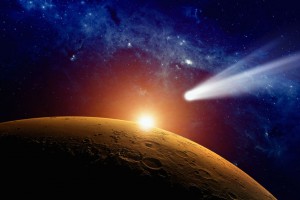The Aliens of the Gaps

Humanists are already familiar with the “God of the gaps” theory, which refers to poorly made arguments assuming that if a phenomenon doesn’t have an immediate explanation, then it can be credited to a deity. Creationists often rely on this fallacy in an attempt to cast aspersions on the veracity of evolution by pointing to supposed gaps in the fossil record and claiming that because scientists cannot yet explain them, an intelligent designer must instead be responsible for the natural world. The theory essentially uses God to fill in any gaps in human understanding.
Fortunately, this argument is easily refuted not only because it leaps to conclusions but also because science is always investigating these inexplicable phenomenon and discovering naturalistic explanations for them. The God of the gaps is always shrinking as scientists increase their understanding of our natural world and find new answers to old questions by studying the observable world.
Oddly enough, as we move toward a more scientific, naturalistic understanding, we seem to still be reaching for explanations, no matter how unlikely, for the inexplicable. Now, however, aliens seem to have replaced God as a go-to explanation to fill in the current gaps in our understanding. For instance, last week, the news was abuzz with two Canadian astronomers who submitted a paper that suggested aliens could be responsible for light pulses they had observed. Other scientists were quick to urge the public not to jump to conclusions. Researchers at the University of California Berkeley’s SETI (Search for Extraterrestrial Intelligence) Institute released a statement reminding the scientific community that “extraordinary claims require extraordinary evidence. It is too early to unequivocally attribute these purported signals to the activities of extraterrestrial civilizations.”
Perhaps attributing inexplicable phenomenon to aliens rather than God is something of an improvement. At least aliens, if they exist, would be part of the natural world, subject to scientific laws, and able to be observed, unlike a supernatural being that requires faith and not reason to be understood. However, because humanists rely on evidence to back up claims to which we ascribe, replacing God with aliens is not necessarily a move toward a more rational society. While some research has found that people from certain religious backgrounds, particularly evangelical Christianity, may feel their faith threatened by the thought of extraterrestrial life, other religious individuals and even their faith’s leaders do not find the potential existence of aliens to contradict their belief systems.
One may wonder, however, how much of a role aliens are now playing in explaining other phenomenon once thought to be supernatural. For instance, researchers suspect that many reports of alien abductions are actually attempts to explain the experience of sleep paralysis, a condition in which an individual is technically awake but is still subject to the immobility that takes place in the state of REM sleep. Previously, this unpleasant sensation was often attributed to the supernatural—demons, witches, and ghosts. Now, however, in a more scientific age, many people who experience sleep paralysis explain the seemingly inexplicable sensation of being both awake and asleep as an alien abduction. Epilepsy, narcolepsy, and other physical and psychological explanations are also likely causes for the sensations related to reports of alien abductions
UFO researcher David Clarke, in a Boston Globe interview, explained the shift from attributing these bizarre experiences to God or demons to attributing them to aliens as a result of our increasingly secular society. People may no longer look to God to make sense of the nonsensical, but they are still looking for explanations. If a scientific or rational explanation is not readily apparent, then people may make sense of a bizarre incident by believing aliens were its cause.
While humanists should continue to support space exploration and many humanists do expect that other forms of life are present in our vast universe, we should also be skeptical of using aliens to fill in gaps in our scientific knowledge. Without evidence, anything, whether God or aliens, should be suspect. The “Aliens of the gaps” might seem like a secular alternative to the “God of the Gaps.” But rather than opening up scientific inquiry into a topic, it seems more likely to stifle exploration of the unknown. Rather than clinging to tenuous explanations for comfort in the face of the inexplicable, we should embrace the ambiguities and mysteries of our natural world and see them as opportunities to expand our knowledge.
